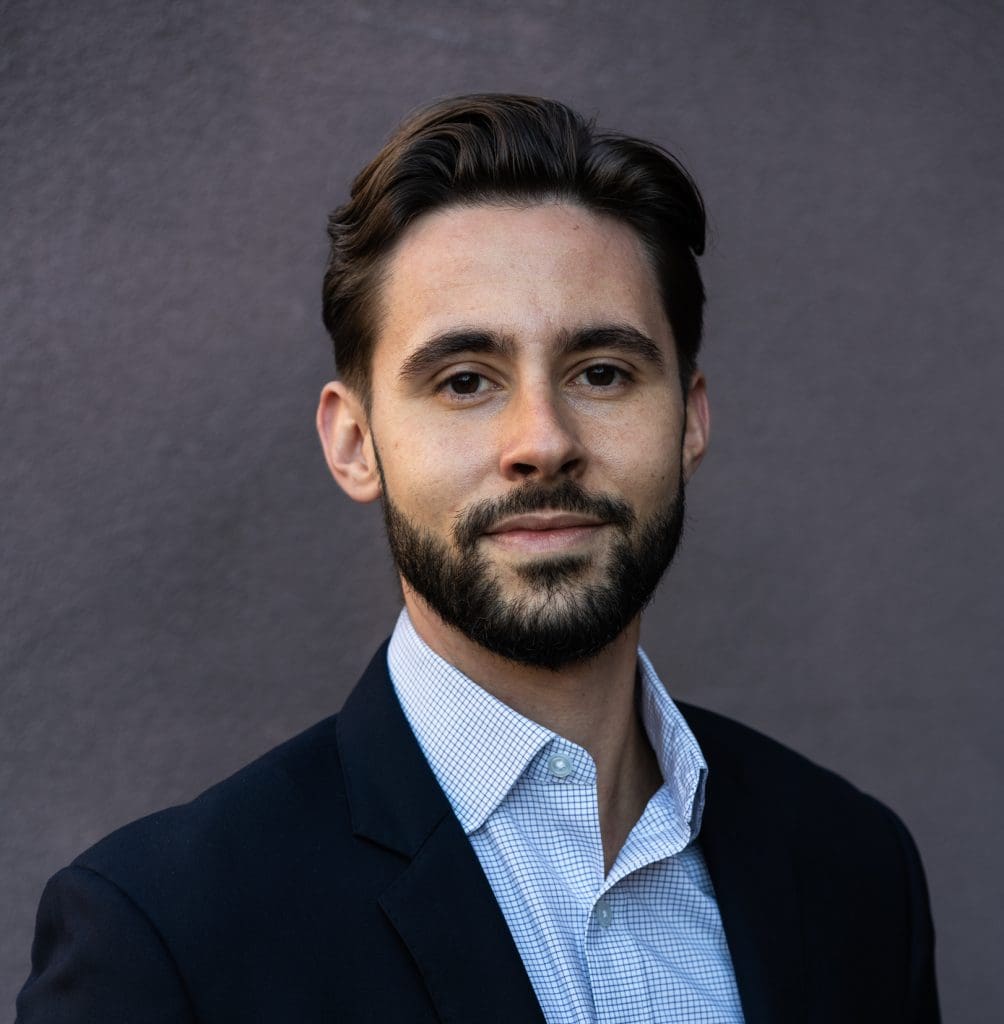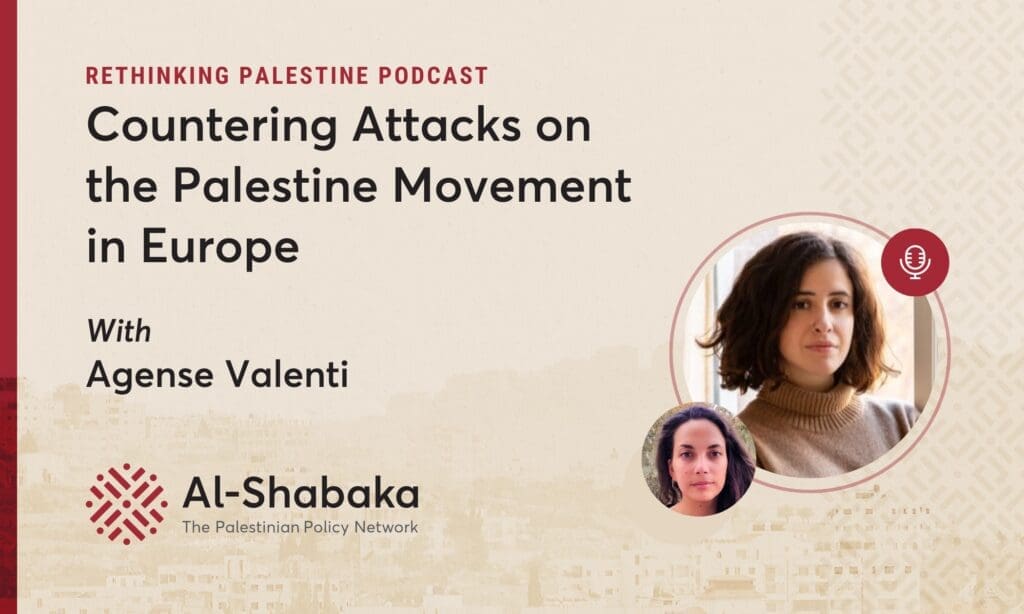About This Episode
Episode Transcript
The transcript below has been lightly edited for brevity and clarity.
Tariq Kenney-Shawa 0:00
Efforts to clamp down on Palestinian solidarity by outlawing boycotts of Israel are just one tactic amid a larger strategy by reactionary elements on both sides of the partisan divide to undermine democratic values in the US. And if they’re successful, these forces will undoubtedly direct their efforts at other forms of protest and free speech that are being leveraged in calls for justice.
Yara Hawari 0:30
From Al-Shabaka, the Palestinian Policy Network, I am Yara Hawari, and this is Rethinking Palestine.
Israeli regime defenders across the US are ramping up efforts to criminalize the constitutionally protected right to boycott, in a clear and direct attack against the BDS movement and Palestinian activists more widely. Not only does this violate US citizens’ rights, It also undermines what many understand to be the very tenants of a democratic country.
Al-Shabaka’s US Policy fellow Tariq Kenney-Shawa wrote a policy brief on this very topic published in December 2022, which can be found on our website. For this episode, he’s here to talk to us a little more about the piece and what it means to challenge anti-boycott legislation in the US. Tariq, thank you for joining me on this episode of Rethinking Palestine.
Tariq Kenney-Shawa 1:24
Thank you for having me on Yara.
Yara Hawari 1:27
Tariq, can you start off by describing the context in which people fighting for Palestinian rights in the US are working in so that we can situate this recent trend of anti-boycott legislation?
Tariq Kenney-Shawa 1:39
Absolutely. So for decades, Palestinians have been denied liberation, whether it be through an independent state or equal rights and all the while life under Israeli occupation and apartheid has only gotten worse. This reality has forced Palestinians and our allies abroad to search for new ways to achieve our rights, and one of them is through boycott, divest, and sanctions. In other words, by refusing to purchase Israeli goods and services, or do business with companies complicit in supporting the Israeli occupation.
BDS aims to exert both internal and international pressure on Israel to end its human rights violations. So in truth, the strategy is very simple. It’s also not unique at all. Political boycotts have been instrumental in human rights movements worldwide, and particularly in bringing an end to apartheid in South Africa and have been leveraged throughout history as an effective means of non-violent protest.
So support at this stage, for BDS in particular, in the US and internationally is still in its infancy, but across the US a growing number of Americans are heating calls to boycott Israeli goods and services. Unsurprisingly, Israel’s apologists are stepping up their efforts at both the state and federal levels to shield Israel from accountability.
And they’re doing this by going straight for our first amendment rights to free speech and political boycotts. And they’re insisting that by criticizing a nation-state’s policies, we are somehow being inherently anti-Semitic. Since 2014, dozens of states have adopted laws designed to punish individuals and companies that refuse to do business with those who profit from the Israeli regime’s occupation.
And their message to us is clear. Take action, any action to hold Israel accountable for its crimes, and you will pay.
Yara Hawari 3:23
Tariq, you mentioned that boycott is not a new political tactic, and indeed it’s been mobilized globally as a legitimate form of protest. Could you perhaps outline some of its history in the US context?
Tariq Kenney-Shawa 3:37
Yeah, you’re absolutely right, Yara. So boycotts are not new at all, especially considering their extensive history in the US. And again, they’re very, very common. In fact, the US itself was born amid a boycott of British tea in Boston back in 1773. So you could even say boycotting as a time-honored American tradition.
To dive into that example a little bit for those not familiar with American history, the Boston Tea Party was the boycott of British tea in response to British taxation without representation when the US was still under British control. This example might sound far off, but it is very useful in understanding the fundamentals.
Just like Americans in 1773, Palestinians are protesting an extreme form of taxation without representation in the form of Israeli military occupation and apartheid. Of course not to compare the two, Israeli occupation and apartheid is far worse, but it hits at the same fundamentals. Since then, boycotts have continued to play an integral role in US history. From the pre-Civil War boycott of goods produced with slave labor to the 1955 Montgomery bus boycott that called for interracial segregation. Boycotts have represented a powerful tool in challenging human rights abuses and fighting for political change both at home and abroad.
Boycotts are also recognized as actually constitutionally protected. As long as their goals are to influence political reform rather than economic gain, which is clearly the case here when it comes to boycotting Israeli goods and services.
This legal precedent was actually reaffirmed back in 1982 when the Supreme Court unanimously upheld the First Amendment right of Black Mississippians to boycott local businesses and protest against segregation and racial inequality. But as we’re seeing now with the current Supreme Court, precedent can easily be overturned.
Yara Hawari 5:31
So what kind of legal maneuvers are we seeing being mobilized at the moment against those wanting to hold the Israeli regime accountable for its violations against Palestinians?
Tariq Kenney-Shawa 5:41
So the legislation being used to target those wishing to hold the Israeli regime accountable is, in all honesty, absurd. I’ll give you some examples that illustrate why.
In 2017, officials in Texas blocked access to hurricane disaster relief funds from those who refused to renounce the right to engage in BDS. Only eventually conceding as a misapplication of the law after facing high public pressure. A year later in 2018, Bahia Amawi, a child speech pathologist in Texas sued the state after she lost her job for refusing to pledge that she will not boycott Israel.
And that same year in 2018 as well, the Arkansas Times, a local newspaper based in Little Rock, Arkansas, sued the state after an advertising contract with a public university, was withdrawn as punishment for refusing to relinquish the right to boycott Israel. In July 2022, just earlier this summer the Eighth Circuit Court became the highest level court to consider that same issue in Arkansas when it ruled against the Arkansas Times, stripping it of its right to boycott.
So I call these laws absurd because in many cases what they’re doing is forcing people who would not have thought twice about Israel/Palestine to effectively sign away their fundamental right to boycott or risk losing their jobs. And this is a choice that very few people would risk their livelihoods for.
Another example of efforts to shield Israel from the same human rights standards applied across the globe are likewise extending into sustainable investment in corporate government spheres. So recently in September 2022, South Carolina’s Treasurer actually joined a growing list of officials threatening to cut ties with the multi-billion dollar investment firm Morningstar over claims that their Sustainalytics programs, environmental, social, and governance ESG rating is actually biased against Israel.
So for those who aren’t aware, ESG ratings, which assess ethical corporate practices ranging from environmental standards to labor practices, have really proven integral in holding these companies accountable regardless of where they operate. So, of course, Israel being a key human rights detractor in Sustainalytics drew attention to Israel’s documented human rights violations and the assessments provided to investors.
So in the face of mounting pressure, Morningstar hired an independent review commission to carry out an exhaustive investigation into any potential bias. And that investigation found neither pervasive nor systemic bias against Israel. However, this obviously failed to bring an end to the smears against the rating system. Leaders on both sides of the political divide continued their attacks on ESG investing as a whole.
For example, Missouri Attorney General Eric Schmidt, decried Morningstar practices as “woke”, ESG investing. Arizona Treasurer, Kimberly Yee suggested that the very idea of reviewing Israeli companies for the same standards to which all other companies are held was anti-Semitic. And her statement, in my opinion, kind of really sums up this approach to Israel and holding Israel accountable, is that Israel’s apologists expect us to hold Israel to an entirely different standard than any other country.
And going back to this example with Morningstar, all of this unfolded despite the fact that their CEO Kunal Kapoor repeatedly insisted that his company does not support the BDS movement. So in other words, apart from a perfect supportive stance on Israel, if you do not abide by that, you will be targeted by the Pro-Israel lobby.
Since the pressure began on Morningstar, the company has adopted a host of anti-Palestinian measures that include refraining from references to the West Bank as occupied, as well as ditching reports issued by the Human Rights Council at the UN. So once again, Israel’s defenders are once again forcing US citizens to choose between First Amendment rights and their ability to work at their jobs and their livelihoods.
Yara Hawari 9:51
If you’re enjoying this podcast, please visit our website, al-shabaka.org, where you’ll find more Palestinian policy analysis and where you can join our mailing list and donate to support our work.
Tariq, it’s quite phenomenal that a US child psychiatrist lost her job because she refused to pledge not to boycott Israel. And this obviously has far-reaching effects. It’s not just about Palestinian activism and Palestine, but we’ll go into that a bit later in the podcast. You’ve outlined a myriad of legal tools that are being used to criminalize boycotts in the US, but who’s behind them? Are they individuals? Are they groups? Is it something more sinister?
Tariq Kenney-Shawa 10:37
So first and foremost, it’s the Israeli government that is responsible itself and they’ve been a core sponsor of efforts like these to shield their country from accountability for decades. That isn’t really surprising at all. What’s more concerning is that many of these bills are being sponsored by conservative lawmakers and interest groups who are actively engaged in undermining a host of different rights that constitute the tenets of a healthy democracy, as you mentioned Yara at the beginning of this conversation.
One of these groups is the American Legislative Exchange Council, or ALEC for Short, which is a notoriously ultra-conservative venture backed by the Koch brothers, which drafts legislation for state and federal governments on behalf of corporate interests.
So in addition to their notorious efforts in shielding Israel from accountability and drafting anti-BDS bills for conservative lawmakers across the country, groups like ALEC have also targeted public education, climate activism, and LGBTQ+ rights, while defending stand-your-ground laws, bans on critical race theory, and most recently, the Supreme Court’s June 2022 reversal of Roe versus Wade.
Why does that all matter? This means that being pro-Israel in the US also entails being complicit in conservative efforts to sustain white supremacy, roll back reproductive rights, and weaken democracy. So it’s critical that we see all of that under the same umbrella, but it’s not Conservatives.
Being blindly pro-Israel has been a bipartisan tradition in the US for a long time. And while that’s beginning to change with this narrative shift and changing opinions in terms of public opinion towards Palestine, establishment Democrats have repeatedly come out in support of these measures. So it’s really critical that we don’t let them off the hook.
It’s interesting that these groups that are behind these legislative maneuvers are homegrown in the US and not at all shocking that they are also involved in propping up white supremacy and the policing of people’s bodies. But that last point you mentioned is crucial that these are bipartisan efforts and the blame can’t only be placed on conservative policymakers or conservative people.
Yara Hawari 12:23
Now as we mentioned earlier, this isn’t simply about fighting for Palestinian rights. This has much wider implications, so I’m wondering if you can tell me a little bit more about what this might mean for others involved in political movements and campaigns for justice across the US.
Tariq Kenney-Shawa 13:10
You’re absolutely correct.
This is why this should concern everyone no matter where you stand on Palestine and the Palestinian struggle for liberation because they won’t stop at boycotts of Israel. If these forces are successful, they’ll use it as a template to target the right to boycott just about anything that goes against their interests.
In fact, several states have already used, these anti-BDS boycott legislations as templates for copycat laws that will criminalize other boycotts and other forms of protests, such as preventing businesses from boycotting fossil fuels and firearms industries.
And for example, we’re seeing in Kentucky, for example, SB 205, which prohibits the state from entering into contracts with companies unless they submit written certification that they will not engage in a boycott of energy companies. So just to reiterate my earlier point, efforts to clamp down on Palestinian solidarity by outlawing boycotts of Israel are just one tactic amid the largest strategy by reactionary elements on both sides of the partisan divide to undermine democratic values in the US.
And if they’re successful, these forces will undoubtedly direct their efforts at other forms of protest and free speech that are being leveraged in calls for justice.
Yara Hawari 14:25
Tariq, the context you have outlined and the maneuvers that you have described seem quite worrying and frightening, particularly when we think about the context of the Israeli regime’s escalation of its colonization project in Palestine.
What can we do as individuals, more importantly as collectives to push back?
Tariq Kenney-Shawa 14:45
That’s a great question. So there’s a lot we can do. And it’s important to stay positive because otherwise, everything seems a little bit too big to act upon. So the most important thing for us to do right now is simply to raise awareness.
And that’s relatively easy. And that entails mobilizing grassroots activism, aimed at pressuring lawmakers, engaging in awareness-raising campaigns, writing op-eds, and things like that. Ultimately, All of these efforts should be aimed at developing stronger checks to an inherently flawed system.
And on this topic, I’m going back to what I mentioned earlier in the Supreme Court’s recent overturning of the long-held precedent, for example, Roe v. Wade. Just because we get our minds wrapped around precedent and what we consider to be First Amendment rights, doesn’t mean that that can disappear literally before our eyes.
So first of all, members of Congress really should fulfill their constitutional duty to defend the rights of US citizens, including First Amendment right to participate in political boycotts. To achieve this, activists civil rights defenders, and concerned citizens should contact their representatives directly to express opposition to laws that restrict the right to boycott.
In doing so, they should highlight the intersectional nature of this assault on social and political expression and organize alongside other groups being affected by similar copycat legislation, similar to the ones that I discussed earlier that affect the gun lobby and fossil fuels.
Another avenue is as workers across the country unionize at the highest rates in decades, civil society organizations should prepare union leaders and members to collectively mobilize against attempts by employers to revoke constitutionally protected rights. Trainings and briefings could be used to prepare union leaders to explicitly incorporate these rights to boycott into their labor demands and provide support to Palestinian or pro-Palestine workers who are targeted in their engagement in boycotts and other forms of political protest.
Activists and academics and NGOs should also coordinate efforts to produce informational material for public campaigns aimed at raising awareness, general awareness and providing US citizens with the tools to advocate for their own constitutionally protected rights. A great example of some recent work has been the recent documentary film Boycott, which served as a great example of how to mobilize free speech activists and raise awareness around this issue.
To sum it all up, there’s a lot we can do and a lot of it entails a lot of grassroots organizing and ensuring that people are educated on the topic. But in the larger long-term picture, what we really need to do is, again, develop these checks to the system that ensure that our First Amendment rights to free speech and political boycott, and political protest will be protected no matter who is president, no matter who is in charge of the Supreme Court, and so on and so forth.
So it’s an all-encompassing job that we need to be working on. But how we can start it is through raising awareness, and that’s something that everyone can do.
Yara Hawari 17:58
Tariq, thank you for ending on a more optimistic note in giving us more concrete actions that we can take amidst this challenging environment that we’re all working and operating in.
We’re gonna have to leave it there, but thank you so much for joining me on Rethinking Palestine.
Tariq Kenney-Shawa 18:17
Thank you, Yara for having me.
Yara Hawari 18:23
Rethinking Palestine is brought to you by Al-Shabaka, the Palestinian Policy Network. Al-Shabaka is the only global, independent Palestinian think tank whose mission is to produce critical policy analysis and collectively imagine a new policy making paradigm for Palestine and Palestinians worldwide. For more information or to donate to support our work, visit al-shabaka.org. And importantly, don’t forget to subscribe to Rethinking Palestine wherever you listen to podcasts.













